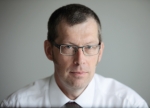 |
||
Home > TERATEC FORUM > Workshop 8
Workshop 8 - Wednesday, June 29 from 14:00 to 17:30
Digital simulation technologies and applications in the healthcare sector
Where are the bottlenecks of genome analysis today?
Abstract : The first next-generation sequencer was introduced in 2005. Since then there has been an explosion of prior inconceivable applications executed on these sequencers. By 2010 rich scientists were sequencing entire human genomes in a few weeks and today the cost of a 30x coverage human genome has decreased to 1000$. This makes it affordable for the deployment in large-scale project. In 2008 the International Cancer Genome Consortium was started with the aim to characterise 25,000 cancer genomes. In order to deal with this type of project, many large-scale sequencing operations were established. This has posed its own challenges as the technology was and still is evolving. Typically an operation is composed of a wet-lab, the sequencing itself and data analysis. There are many peripheral aspects of sequence analysis that today still do not have the same degree of sophistication and maturity as the sequencing technology itself. There is a lack of standardisation of procedures, terminology and metrics to assess the quality of sequencing. Further computational methods for processing, storing and rendering results are in need of improvement. I will describe these issues and show the approaches that we have chosen and are further developing towards resolving these problems for a full deployment of genomic sequencing for precision medicine.
 |
Ivo Gut is a Director of the Centro Nacional de Análisis Genómico (CNAG) in Barcelona, one of the largest European genome sequencing operations, which he established in 2010. His research interests are genomics, genetics, high-throughput nucleic acid analysis methods, proteomics, implementation of –omics methods, omics technologies, automation bioinformatics, data analysis, disease gene identification, cancer genomics, agrogenomics. He has more than 20 years experience in high-throughput nucleic analysis (genotyping and sequencing DNA, RNA and DNA methylation), technology development in nucleic acid and protein analysis. He was Head of Technology Development and Associate Director at the Centre National de Génotypage (CNG) – CEA (1999-2009), where he established the highest throughput genotyping platform in Europe and executed many genome-wide association studies, he initiated and was the coordinator of the EU-funded Project READNA in which 2nd, 3rd and 4th generation nucleic acid analysis technologies were developed. READNA Consortium was awarded with “Stars of Europe” Prize from the French Ministry of Higher Education and Research in 2013. He received his PhD in Physical Chemistry from the University of Basel in 1990. After his appointments as Research Fellow at Harvard Medical School and Imperial Cancer Research Foundation of London, he led a group in the Department for Vertebrate Genomics at Max-Planck-Institute for Molecular Genetics. He is author of more than 300 research papers, 11 reviews and 12 book chapters, cited over 21 000 times, inventor of 25 patents or patent applications, founder of 4 biotech start-ups, and serves on numerous international advisory boards. |
Register now and get your badge here
- TERATEC Forum is strictly reserved for professionals.
- Participation to exhibition, conferences and workshops is free (subject to seats available)
- On line registration is obligatory to attend exhibition, conferences or the workshops.
- The Vigipirate security plan being raised to its highest level, it is mandatory to register online in advance and come with an identity card order to participate in TERATEC Forum.
- The badge is free of charge and give you access to all events TERATEC Forum.
For any other information regarding the workshops, please contact :
Jean-Pascal JEGU
Tel : +33 (0)9 70 65 02 10
jean-pascal.jegu@teratec.fr
Campus TERATEC
2, rue de la Piquetterie
91680 BRUYERES-LE-CHATEL
France